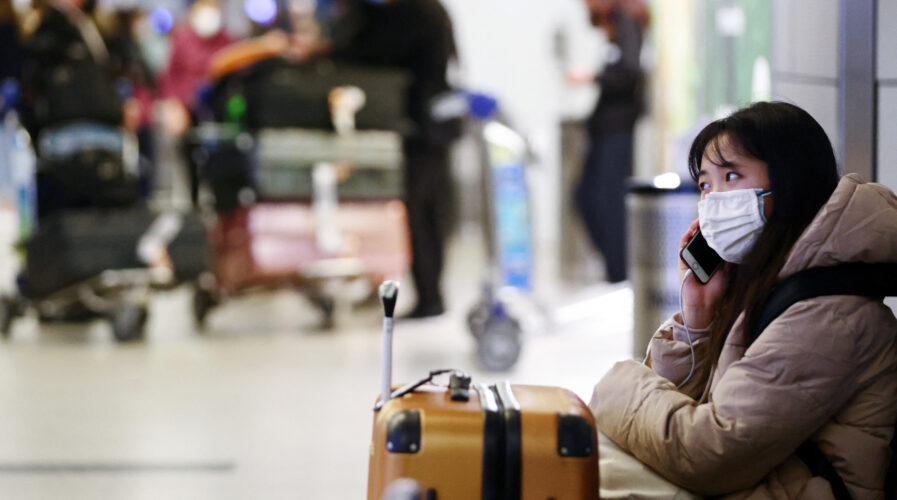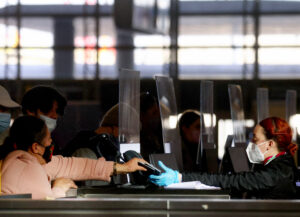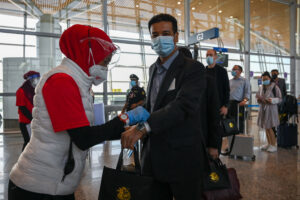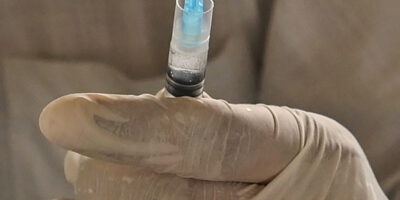
Over 109 million Americans will be traveling during the holiday season. Mario Tama/Getty Images/AFP (Photo by MARIO TAMA / GETTY IMAGES NORTH AMERICA / Getty Images via AFP)
Fake vaccine passports wont get you anywhere this Christmas
- Demand for increasing fake vaccine certificates and passports has been reported globally.
- Verification technology is able to detect fake vaccine passports in real-time.
- Several countries are already implementing verification solutions for vaccine digital credentials to ensure authenticity
Vaccine passports are now a prerogative for everyone hoping to travel overseas. While some countries are still open to unvaccinated travels, with some quarantine restrictions in place for them upon arrival, generally every country accepting international travelers or returning citizens are prioritizing vaccine passports.
And now with the Christmas holidays around the corner, travelers are busy making travel plans. The only thing stopping them from travelling is having authentic vaccination certificates. Most countries have restricted movement for unvaccinated travelers.
Put simply, travelers that are vaccinated against the COVID-19 pandemic experience a smoother traveling experience compared to those that are not. As such, there has been an increase in demand for fake vaccine certificates globally.
While there can be vaccine exemptions available for some travelers, governments and immigration services are not making it a simple process. For example, Australian travel restrictions have very strict and specific rules that must be followed before anyone can be exempted.
The BBC recently uncovered fraudsters directing users on Facebook to sites claiming to sell fake COVID-19 vaccine passes for those who have not been jabbed. In the UK, vaccine passes are required as proof to access certain places as well as avoiding quarantine after returning from international travel.
The report also stated that COVID-19 have been found for sale alongside drugs, weapons, and stolen goods on the dark web, with sellers claiming to provide documentation from many countries, including the US and the EU. Some sellers on Facebook even claimed to be able to provide certificates from 22 countries including Portugal, France, Greece, Spain, Australia, Latvia, Morocco, and the UK.
Over in Southeast Asia, vaccine passports are facing a similar problem as well. Countries like Malaysia and Singapore have recorded high vaccination rates. But recent reports have shown that demand for fake vaccine passes is still high. The Straits Times reported that vaccine certificates are being sold on social media in Malaysia, including non-digital certificates.
Authenticating Vaccine Passports
While fake vaccine passports and certs may be available online, using them to get through immigration is almost impossible today. This is because most governments have invested and partnered with authentication and verification solutions to verify COVID-19 digital credentials.

A traveler hands passports to an airline agent while checking in at the international terminal at Los Angeles International Airport (LAX) amid a surge in Omicron variant cases. (Photo by MARIO TAMA / GETTY IMAGES NORTH AMERICA / Getty Images via AFP)
One of them is Affinidi Travel. Affinidi Travel’s verification solution can verify COVID-19 digital credentials from over 2,000 healthcare labs from across the world, and read eight other national health standards for vaccination certificates to which over 30 countries adhere to such as the EU Digital COVID certificate, Malaysia’s MySejahtera, Hong Kong’s HealthCode, Israel’s Green Pass, India’s DIVOC, Singapore’s HealthCerts, Korea’s COOV, Australia’s ICA VDS and other digital credentials such as IATA Travel Pass, AOK Health Pass, and SMART Health Cards.
According to Toby Berger, Director at Affinidi Travel, there weren’t a lot of solutions in the marketplace that enabled anyone to verify vaccine or test certificates. At the same time, there was a quick rise of fraudulent certs in the market, mostly by people who didn’t want to get vaccinated or couldn’t afford it.
“We built a solution that enabled the replication of the vaccination test certificate and did it in a privacy-preserving way. No data is exchanged between a traveler and the government or an airline. The data is kept in place and only critical data is shared to ensure a passenger can travel and enter a country,” said Toby.
Most vaccination certificates have a digital code. Affinidi’s solution scans the QR codes that have all the information required. The data is then run across the rules of the airline, or a government has to enable entry. The entire process happens in real-time. The only challenge is for non-digital certificates, which require a bit more authentication processes.
When it comes to data privacy, as the cyber threat landscape evolves, businesses and governments need to ramp up data privacy and safeguards to prevent data breaches or compromise. For Toby, this is why digital trust must be forged and strengthened, and privacy-preserving, decentralized technologies, will increasingly take on a bigger role.

(Photo by Mohd RASFAN / AFP)
“With decentralized technology and verifiable credentials, individuals everywhere can gain ownership of their own digital identity, claim their credentials, and share data selectively in a privacy-preserving manner as they consume digital services from different providers. These allow them to unlock opportunities and the potential to enjoy life to the fullest,” explained Toby.
With new COVID-19 variants like Omicron disrupting travel plans for many, governments will only continue to make changes to travel requirements. For travelers, as long they have an authentic vaccine passport, they should not worry much about it. However, for those trying to buy their way in, it may just be the end of the line for them.
In fact, Toby believes authentication methods in the future will be more sophisticated, especially for vaccine passports, with emerging technologies enabling endless possibilities.
“We will see a massive acceleration in touchless and identity technologies. In some countries, you can already bind your passports to your identity. For example, you just need to use facial recognition to clear customs and immigration. You can eventually tie health credentials to the identity and biometrics will solve the rest in the future,” concluded Toby.
READ MORE
- Ethical AI: The renewed importance of safeguarding data and customer privacy in Generative AI applications
- How Japan balances AI-driven opportunities with cybersecurity needs
- Deploying SASE: Benchmarking your approach
- Insurance everywhere all at once: the digital transformation of the APAC insurance industry
- Google parent Alphabet eyes HubSpot: A potential acquisition shaping the future of CRM


